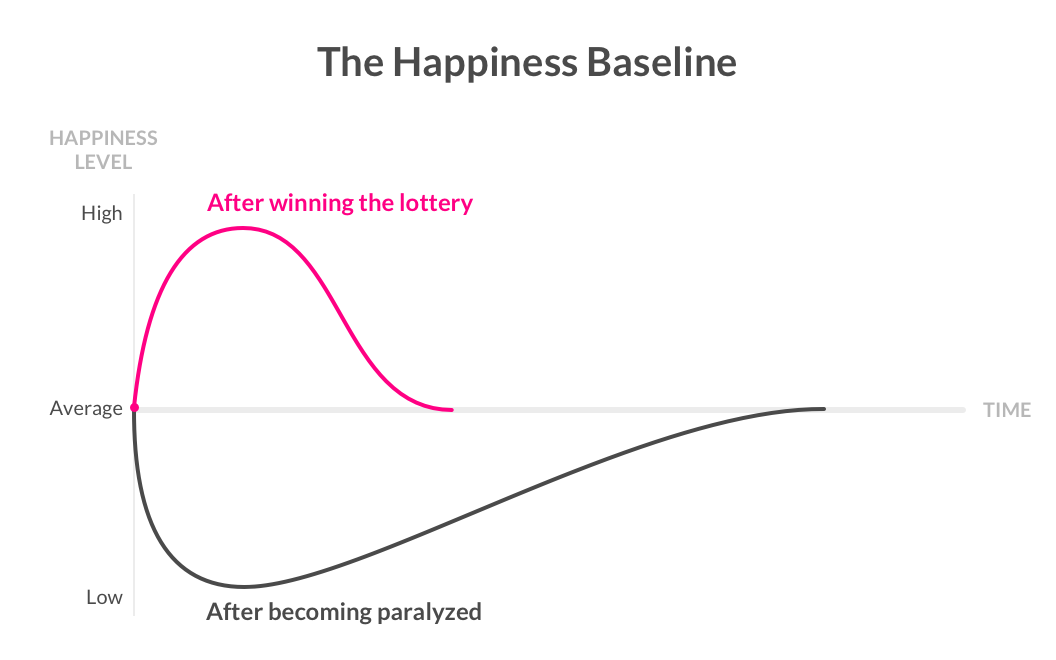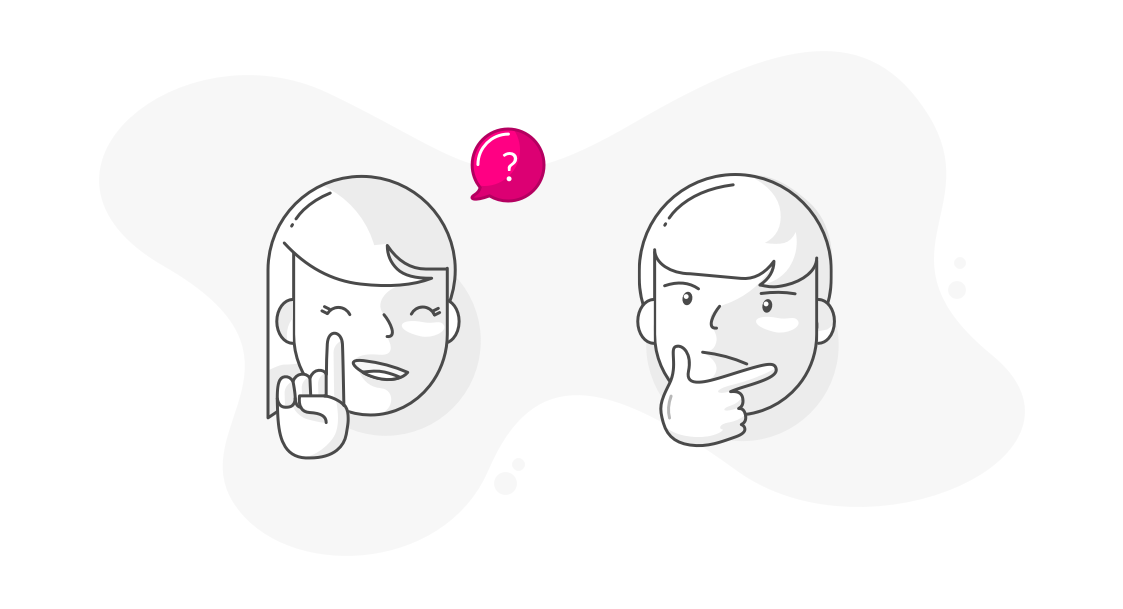It’s easy to assume everyone around you is happy. But the truth is, all of us deal with stress, overload, and gloom more often than you’d think (yes, even your favorite Instagram influencer).
When feeling down, many of us slip into thoughts like, I’d be happier if I could go on a 2-week vacation, or lose some weight, or get that raise.
But would losing weight or getting a raise actually make you happier?
Consider this: A famous study at Northwestern University found that people who win the $20 million lottery are not happier one year later. Similarly, after a few years, people who become paralyzed are not any less happy than they were before the accident.

While you’d think these events would impact people’s happiness levels, humans adapt to new realities easily. Millionaires get used to their shiny new houses and cars, and paraplegics adapt to their new circumstances, too.
The contrast between ‘before’ and ‘after’ blurs, and the new normal becomes a baseline for daily life.
The happiness formula
So the question is: What makes humans happier?
According to research by Positive Psychology founder Martin Seligman, this is the happiness formula:
Happiness level = genetic happiness baseline (50%) + daily activities (40%) + life circumstances (10%)
In other words, half of your happiness is determined by your genes, 40% by the activities you do every day, and a small percentage by the things that happen to you (ex. getting a raise, losing weight).
So, the key to being happier?
1. Do ‘daily activities’ that boost your well being
2. Elevate your ‘genetic happiness baseline’ (yep, that’s possible)
Here’s how.
What to do every day
Remember how humans adapt to winning the lottery and becoming paralyzed? Similarly, we get used to basically anything that becomes a normal part of our lives (with a few exceptions). In psychology speak, this is called the ‘adaptation principle.’
How can you hack this?
1. Switch up your habits and routine as often as you can
What to do:
Take a new route to work. Eat at a new restaurant. Visit a town nearby you’ve never been to. Take a class to learn something new.
Why:
While we get used to the things we see and do every day, our brains are extra sensitive to new stimuli and information. In other words, our brains perceive change as vital information worth our attention – not steady states.
Because of that, new, exciting things have a much bigger impact on our happiness than the same ol’ pleasures do.
2. Stop to appreciate the things that happen to you
What to do:
Recap a positive memory with a friend. Think about the last time you laughed. Write down 3 things you appreciate before you go to sleep.
Why:
Since humans adapt easily, we need to work extra hard to derive pleasure from good things in our lives or things we achieve. Have you ever worked hard to plan an event, only not to appreciate your accomplishment once it’s over?
As David Brooks wrote in a recent New York Times op-ed,
“When the editor of my first book called to tell me it had made the best-seller list, it felt like … nothing. It was external to me. If you build your life around career success, your ambitions will always race out in front of what you’ve achieved, leaving you anxious and dissatisfied.”
To combat this, take extra time to think about, write down, or discuss the good things that happen to you. People who had a daily habit of writing down 3 things they’re grateful were happier not only immediately afterwards, but also one week, one month, and even six months later, according to a famous study by Prof. Martin Seligman.
3. Prioritize your relationships
What to do:
Invest in your friendships. Make as many plans (and cancel as few of them) as possible. Have deep conversations with friends. Share your positive moments with them.

Why:
There are few things humans never adapt to, and one of them is relationships. Our friends celebrate our happy moments, and comfort us when we’re sad. They make us laugh, and prevent loneliness. They’re the all-purpose tonic for a happy life:
“If you want to predict how happy someone is, or how long she will live, you should find out about her social relationships… No man, woman, or child is an island. We are ultrasocial creatures, and we can’t be happy without having friends.” – NYU Prof. Jonathan Haidt
How to rewire your brain
Now that you know how to hack your daily activities to genuinely boost your happiness, let’s discuss your ‘genetic happiness baseline.’ Your baseline determines half of your happiness levels at any given moment. And while it’s mostly set, there are two major things you can do to increase your brain’s capacity for happiness:
1. Exercise
What to do:
Move your body for 20 minutes a day, every day.
Why:
Exercise promotes neurogenesis and the release of ‘happy hormones’ (endorphins and serotonin), all of which change your brain and boost happiness.
No need to run a 10k to reap the benefits – raising your heart rate for just 20 minutes will do the trick. But take note that the impact of exercise is short-lived – exercising on a Monday won’t boost your happiness on a Tuesday. The key here is consistency.
2. Meditate
What to do:
Meditate for 2 minutes a day, 21 days in a row
Why:
Meditation lowers your stress hormone (cortisol), shrinks the part of your brain that controls anxiety and fear (amygdala), and increases activity in the happy zone of your brain (the prefrontal cortex) – expanding your neurological capacity for happiness.
And just as with exercise, the key to meditation is consistency, not duration.
Four happiness rules to live by
That was a lot to take in. Here’s the TL;DR:
1. Seek out new experiences
2. Savor the things you’re grateful for
3. Prioritize your relationships
4. Exercise for your body and mind
Being proactive towards happiness isn’t easy, but things worth doing rarely are.
Prioritizing your happiness will create a ripple effect through your life, boosting not only your fitness levels and social life, but also your productivity, creativity, and your sense of purpose.
—
Like what you’re reading? Make sure to check out more goodies like this on the Lemonade Blog.